- Home
- John Irving
In One Person
In One Person Read online
"This tender exploration of nascent desire, of love and loss, manages to be sweeping, brilliant, political, provocative, tragic, and funny--it is precisely the kind of astonishing alchemy we associate with a John Irving novel. The unfolding of the AIDS epidemic in the United States in the '80s was the defining moment for me as a physician. With my patients' deaths, almost always occurring in the prime of life, I would find myself cataloging the other losses--namely, what these people might have offered society had they lived the full measure of their days: their art, their literature, the children they might have raised. In One Person is the novel that for me will define that era. A profound truth is arrived at in these pages. It is Irving at his most daring, at his most ambitious. It is America and American writing, both at their very best."
-- ABRAHAM VERGHESE
"In One Person is a novel that makes you proud to be human. It is a book that not only accepts but also loves our differences. From the beginning of his career, Irving has always cherished our peculiarities--in a fierce, not a saccharine, way. Now he has extended his sympathies--and ours--still further into areas that even the misfits eschew. Anthropologists say that the interstitial--whatever lies between two familiar opposites--is usually declared either taboo or sacred. John Irving in this magnificent novel--his best and most passionate since The World According to Garp--has sacralized what lies between polarizing genders and orientations. And have I mentioned it is also a gripping page-turner and a beautifully constructed work of art?"
-- EDMUND WHITE
A compelling novel of desire, secrecy, and sexual identity, In One Person is a story of unfulfilled love--tormented, funny, and affecting--and an impassioned embrace of our sexual differences. Billy, the bisexual narrator and main character of In One Person, tells the tragicomic story (lasting more than half a century) of his life as a "sexual suspect," a phrase first used by John Irving in 1978 in his landmark novel of "terminal cases," The World According to Garp.
His most political novel since The Cider House Rules and A Prayer for Owen Meany, John Irving's In One Person is a poignant tribute to Billy's friends and lovers--a theatrical cast of characters who defy category and convention. Not least, In One Person is an intimate and unforgettable portrait of the solitariness of a bisexual man who is dedicated to making himself "worthwhile."
ABOUT JOHN IRVING
The World According to Garp, which won the National Book Award in 1980, was John Irving's fourth novel and his first international bestseller; it also became a George Roy Hill film. Tony Richardson wrote and directed the adaptation for the screen of The Hotel New Hampshire (1984). Irving's novels are now translated into thirty-five languages, and he has had nine international bestsellers. Worldwide, the Irving novel most often called "an American classic" is A Prayer for Owen Meany (1989), the portrayal of an enduring friendship at that time when the Vietnam War had its most divisive effect on the United States.
In 1992, John Irving was inducted into the National Wrestling Hall of Fame in Stillwater, Oklahoma. (He competed as a wrestler for twenty years, until he was thirty-four, and coached the sport until he was forty-seven.) In 2000, Irving won the Oscar for Best Adapted Screenplay for The Cider House Rules, a Lasse Hallstrom film that earned seven Academy Award nominations. Tod Williams wrote and directed The Door in the Floor, the 2004 film adapted from Irving's ninth novel, A Widow for One Year.
In One Person is John Irving's thirteenth novel.
MEET THE AUTHORS, WATCH VIDEOS AND MORE AT
SimonandSchuster.com
THE SOURCE FOR READING GROUPS
JACKET DESIGN BY JACKIE SEOW
JACKET PHOTOGRAPH BY MARK DYE FOR SIMON & SCHUSTER
COPYRIGHT (c) 2012 SIMON & SCHUSTER
ALSO BY JOHN IRVING
Setting Free the Bears
The Water-Method Man
The 158-Pound Marriage
The World According to Garp
The Hotel New Hampshire
The Cider House Rules
A Prayer for Owen Meany
A Son of the Circus
The Imaginary Girlfriend
Trying to Save Piggy Sneed
A Widow for One Year
My Movie Business
The Cider House Rules: A Screenplay
The Fourth Hand
A Sound Like Someone Trying Not to Make a Sound
Until I Find You
Last Night in Twisted River
Simon & Schuster
1230 Avenue of the Americas
New York, NY 10020
www.SimonandSchuster.com
This book is a work of fiction. Names, characters, places, and incidents either are products of the author's imagination or are used fictitiously. Any resemblance to actual events or locales or persons, living or dead, is entirely coincidental.
Copyright (c) 2012 by Garp Enterprises, Ltd.
All rights reserved, including the right to reproduce this book or portions thereof in any form whatsoever. For information address Simon & Schuster Subsidiary Rights Department, 1230 Avenue of the Americas, New York, NY 10020
First Simon & Schuster hardcover edition May 2012
SIMON & SCHUSTER and colophon are registered trademarks of Simon & Schuster, Inc.
The Simon & Schuster Speakers Bureau can bring authors to your live event. For more information or to book an event, contact the Simon & Schuster Speakers Bureau at 1-866-248-3049 or visit our website at www.simonspeakers.com.
Designed by Nancy Singer
Library of Congress Cataloging-in-Publication Data Irving, John.
In one person : a novel / John Irving.
p. cm.
1. Domestic fiction. 2. Psychological fiction. I. Title.
PS3559.R8I5 2012
813'.54--dc23 2011039707
ISBN 978-1-4516-6412-6 (print)
ISBN 978-1-4516-6415-7 (eBook)
For Sheila Heffernon and David Rowland
and in memory of Tony Richardson
Thus play I in one person many people,
And none contented.
--WILLIAM SHAKESPEARE, Richard II
Thank you for purchasing this Simon & Schuster eBook.
Sign up for our newsletter and receive special offers, access to bonus content, and info on the latest new releases and other great eBooks from Simon & Schuster.
or visit us online to sign up at
eBookNews.SimonandSchuster.com
Chapters
1. AN UNSUCCESSFUL CASTING CALL
2. CRUSHES ON THE WRONG PEOPLE
3. MASQUERADE
4. ELAINE'S BRA
5. LEAVING ESMERALDA
6. THE PICTURES I KEPT OF ELAINE
7. MY TERRIFYING ANGELS
8. BIG AL
9. DOUBLE WHAMMY
10. ONE MOVE
11. ESPANA
12. A WORLD OF EPILOGUES
13. NOT NATURAL CAUSES
14. TEACHER
In One Person
Chapter 1
AN UNSUCCESSFUL CASTING CALL
I'm going to begin by telling you about Miss Frost. While I say to everyone that I became a writer because I read a certain novel by Charles Dickens at the formative age of fifteen, the truth is I was younger than that when I first met Miss Frost and imagined having sex with her, and this moment of my sexual awakening also marked the fitful birth of my imagination. We are formed by what we desire. In less than a minute of excited, secretive longing, I desired to become a writer and to have sex with Miss Frost--not necessarily in that order.
I met Miss Frost in a library. I like libraries, though I have difficulty pronouncing the word--both the plural and the singular. It seems there are certain words I have considerable trouble pronouncing: nouns, for the most part--people, places, and things that hav
e caused me preternatural excitement, irresolvable conflict, or utter panic. Well, that is the opinion of various voice teachers and speech therapists and psychiatrists who've treated me--alas, without success. In elementary school, I was held back a grade due to "severe speech impairments"--an overstatement. I'm now in my late sixties, almost seventy; I've ceased to be interested in the cause of my mispronunciations. (Not to put too fine a point on it, but fuck the etiology.)
I don't even try to say the etiology word, but I can manage to struggle through a comprehensible mispronunciation of library or libraries--the botched word emerging as an unknown fruit. ("Liberry," or "liberries," I say--the way children do.)
It's all the more ironic that my first library was undistinguished. This was the public library in the small town of First Sister, Vermont--a compact red-brick building on the same street where my grandparents lived. I lived in their house on River Street--until I was fifteen, when my mom remarried. My mother met my stepfather in a play.
The town's amateur theatrical society was called the First Sister Players; for as far back as I can remember, I saw all the plays in our town's little theater. My mom was the prompter--if you forgot your lines, she told you what to say. (It being an amateur theater, there were a lot of forgotten lines.) For years, I thought the prompter was one of the actors--someone mysteriously offstage, and not in costume, but a necessary contributor to the dialogue.
My stepfather was a new actor in the First Sister Players when my mother met him. He had come to town to teach at Favorite River Academy--the almost-prestigious private school, which was then all boys. For much of my young life (most certainly, by the time I was ten or eleven), I must have known that eventually, when I was "old enough," I would go to the academy. There was a more modern and better-lit library at the prep school, but the public library in the town of First Sister was my first library, and the librarian there was my first librarian. (Incidentally, I've never had any trouble saying the librarian word.)
Needless to say, Miss Frost was a more memorable experience than the library. Inexcusably, it was long after meeting her that I learned her first name. Everyone called her Miss Frost, and she seemed to me to be my mom's age--or a little younger--when I belatedly got my first library card and met her. My aunt, a most imperious person, had told me that Miss Frost "used to be very good-looking," but it was impossible for me to imagine that Miss Frost could ever have been better-looking than she was when I met her--notwithstanding that, even as a kid, all I did was imagine things. My aunt claimed that the available men in the town used to fall all over themselves when they met Miss Frost. When one of them got up the nerve to introduce himself--to actually tell Miss Frost his name--the then-beautiful librarian would look at him coldly and icily say, "My name is Miss Frost. Never been married, never want to be."
With that attitude, Miss Frost was still unmarried when I met her; inconceivably, to me, the available men in the town of First Sister had long stopped introducing themselves to her.
THE CRUCIAL DICKENS NOVEL--the one that made me want to be a writer, or so I'm always saying--was Great Expectations. I'm sure I was fifteen, both when I first read it and when I first reread it. I know this was before I began to attend the academy, because I got the book from the First Sister town library--twice. I won't forget the day I showed up at the library to take that book out a second time; I'd never wanted to reread an entire novel before.
Miss Frost gave me a penetrating look. At the time, I doubt I was as tall as her shoulders. "Miss Frost was once what they call 'statuesque,' " my aunt had told me, as if even Miss Frost's height and shape existed only in the past. (She was forever statuesque to me.)
Miss Frost was a woman with an erect posture and broad shoulders, though it was chiefly her small but pretty breasts that got my attention. In seeming contrast to her mannish size and obvious physical strength, Miss Frost's breasts had a newly developed appearance--the improbable but budding look of a young girl's. I couldn't understand how it was possible for an older woman to have achieved this look, but surely her breasts had seized the imagination of every teenage boy who'd encountered her, or so I believed when I met her--when was it?--in 1955. Furthermore, you must understand that Miss Frost never dressed suggestively, at least not in the imposed silence of the forlorn First Sister Public Library; day or night, no matter the hour, there was scarcely anyone there.
I had overheard my imperious aunt say (to my mother): "Miss Frost is past an age where training bras suffice." At thirteen, I'd taken this to mean that--in my judgmental aunt's opinion--Miss Frost's bras were all wrong for her breasts, or vice versa. I thought not! And the entire time I was internally agonizing over my and my aunt's different fixations with Miss Frost's breasts, the daunting librarian went on giving me the aforementioned penetrating look.
I'd met her at thirteen; at this intimidating moment, I was fifteen, but given the invasiveness of Miss Frost's long, lingering stare, it felt like a two-year penetrating look to me. Finally she said, in regard to my wanting to read Great Expectations again, "You've already read this one, William."
"Yes, I loved it," I told her--this in lieu of blurting out, as I almost did, that I loved her. She was austerely formal--the first person to unfailingly address me as William. I was always called Bill, or Billy, by my family and friends.
I wanted to see Miss Frost wearing only her bra, which (in my interfering aunt's view) offered insufficient restraint. Yet, in lieu of blurting out such an indiscretion as that, I said: "I want to reread Great Expectations." (Not a word about my premonition that Miss Frost had made an impression on me that would be no less devastating than the one that Estella makes on poor Pip.)
"So soon?" Miss Frost asked. "You read Great Expectations only a month ago!"
"I can't wait to reread it," I said.
"There are a lot of books by Charles Dickens," Miss Frost told me. "You should try a different one, William."
"Oh, I will," I assured her, "but first I want to reread this one."
Miss Frost's second reference to me as William had given me an instant erection--though, at fifteen, I had a small penis and a laughably disappointing hard-on. (Suffice it to say, Miss Frost was in no danger of noticing that I had an erection.)
My all-knowing aunt had told my mother I was underdeveloped for my age. Naturally, my aunt had meant "underdeveloped" in other (or in all) ways; to my knowledge, she'd not seen my penis since I'd been an infant--if then. I'm sure I'll have more to say about the penis word. For now, it's enough that you know I have extreme difficulty pronouncing "penis," which in my tortured utterance emerges--when I can manage to give voice to it at all--as "penith." This rhymes with "zenith," if you're wondering. (I go to great lengths to avoid the plural.)
In any case, Miss Frost knew nothing of my sexual anguish while I was attempting to check out Great Expectations a second time. In fact, Miss Frost gave me the impression that, with so many books in the library, it was an immoral waste of time to reread any of them.
"What's so special about Great Expectations?" she asked me.
She was the first person I told that I wanted to be a writer "because of" Great Expectations, but it was really because of her.
"You want to be a writer!" Miss Frost exclaimed; she didn't sound happy about it. (Years later, I would wonder if Miss Frost might have expressed indignation at the sodomizer word had I suggested that as a profession.)
"Yes, a writer--I think so," I said to her.
"You can't possibly know that you're going to be a writer!" Miss Frost said. "It's not a career choice."
She was certainly right about that, but I didn't know it at the time. And I wasn't pleading with her only so she would let me reread Great Expectations; my pleas were especially ardent, in part, because the more exasperated Miss Frost became with me, the more I appreciated the sudden intake of her breath--not to mention the resultant rise and fall of her surprisingly girlish breasts.
At fifteen, I was as smitten and undone by her as I'd been
two years earlier. No, I must revise that: I was altogether more captivated by her at fifteen than I was at thirteen, when I'd been merely fantasizing about having sex with her and becoming a writer--whereas, at fifteen, the imagined sex was more developed (there were more concrete details) and I had already written a few sentences I admired.
Both the sex with Miss Frost and actually being a writer were unlikely, of course--but were they remotely possible? Curiously, I had enough hubris to believe so. As for where such an exaggerated pride or unearned self-confidence came from--well, I could only guess that genes had something to do with it.
I don't mean my mother's; I saw no hubris in her backstage role of the prompter. After all, I spent most of my evenings with my mom in that safe haven for those variously talented (and untalented) members of our town's amateur theatrical society. That little playhouse was not a uniformly prideful or brimming-with-confidence kind of place--hence the prompter.
If my hubris was genetic, it surely came from my biological father. I was told I'd never met him; I knew him only by his reputation, which didn't sound great.
"The code-boy," as my grandfather referred to him--or, less often, "the sergeant." My mom had left college because of the sergeant, my grandmother said. (She preferred "sergeant," which she always said disparagingly, to "code-boy.") Whether William Francis Dean was the contributing cause of my mom leaving college, I didn't really know; she'd gone to secretarial school instead, but not before he'd gotten her pregnant with me. Consequently, my mother would leave secretarial school, too.
My mom told me that she'd married my dad in Atlantic City, New Jersey, in April 1943--a little late for a shotgun wedding, because I'd been born in First Sister, Vermont, back in March of '42. I was already a year old when she married him, and the "wedding" (it was a town-clerk or justice-of-the-peace deal) had been chiefly my grandmother's idea--or so my aunt Muriel said. It was implied to me that William Francis Dean hadn't entered into the marriage all that willingly.

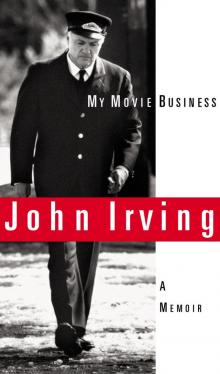 My Movie Business: A Memoir
My Movie Business: A Memoir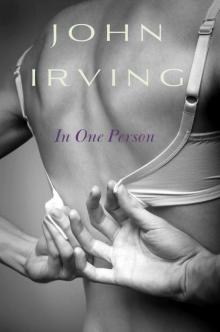 In One Person
In One Person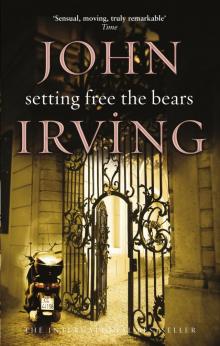 Setting Free the Bears
Setting Free the Bears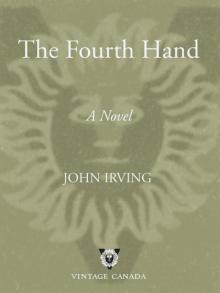 The Fourth Hand
The Fourth Hand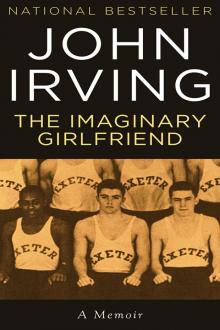 The Imaginary Girlfriend
The Imaginary Girlfriend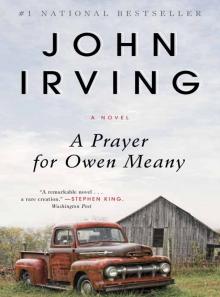 A Prayer for Owen Meany
A Prayer for Owen Meany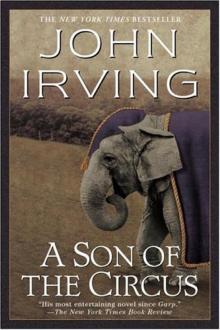 A Son of the Circus
A Son of the Circus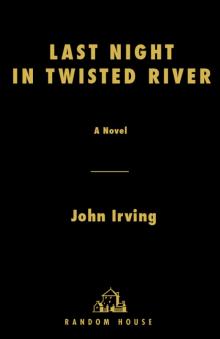 Last Night in Twisted River
Last Night in Twisted River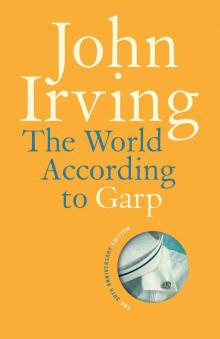 The World According to Garp
The World According to Garp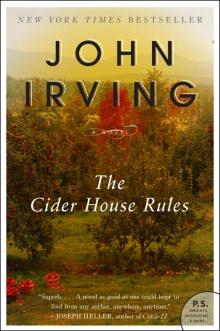 The Cider House Rules
The Cider House Rules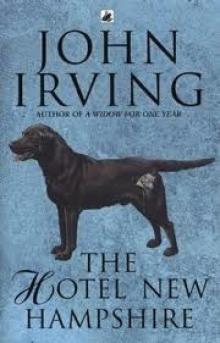 The Hotel New Hampshire
The Hotel New Hampshire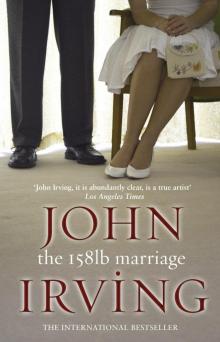 The 158-Pound Marriage
The 158-Pound Marriage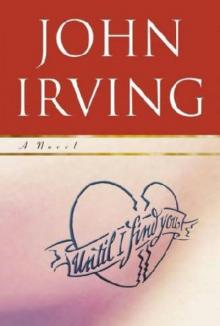 Until I Find You
Until I Find You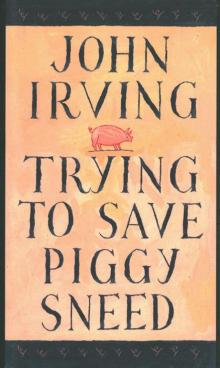 Trying to Save Piggy Sneed
Trying to Save Piggy Sneed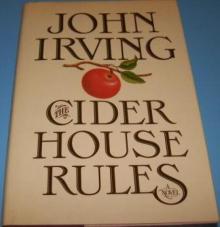 Cider House Rules
Cider House Rules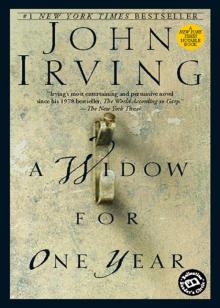 A Widow for One Year
A Widow for One Year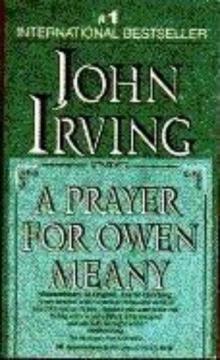 A prayer for Owen Meany: a novel
A prayer for Owen Meany: a novel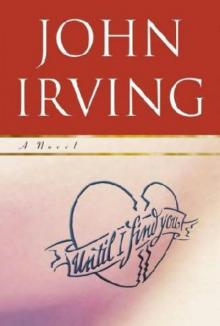 (2005) Until I Find You
(2005) Until I Find You